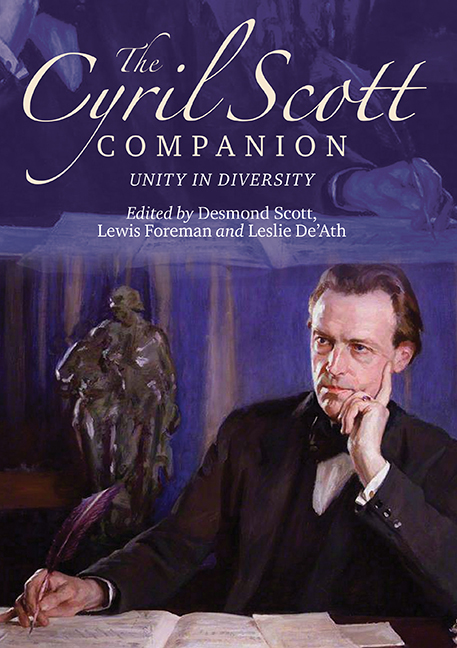Book contents
- Frontmatter
- Dedication
- Contents
- List of Illustrations
- List of Tables
- List of Contributors
- Foreword
- Preface
- Acknowledgements
- Editors' Note
- I SCOTT IN CONTEXT
- 1 From Frankfurt with Love: Friendships Observed through Correspondence and Reminiscence
- 2 Cyril Scott, Debussy and Stravinsky
- 3 Cyril Scott and the BBC
- 4 A Contemporary Composer's View of Cyril Scott's Music: ‘The Subtle Composer of the Prize-Winning Overture’
- 5 ‘Music for the Martians’: Scott's Reception and Reputation at Home and Abroad
- 6 Rose Allatini: Theme and Variations
- 7 Memories of the Man I Barely Knew
- II THE MUSIC
- III THE WRITINGS
- IV PERSONAL REMINISCENCES
- APPENDICES
- CATALOGUES, DISCOGRAPHY AND BIBLIOGRAPHY
- Index of Works
- General Index
4 - A Contemporary Composer's View of Cyril Scott's Music: ‘The Subtle Composer of the Prize-Winning Overture’
from I - SCOTT IN CONTEXT
Published online by Cambridge University Press: 14 September 2019
- Frontmatter
- Dedication
- Contents
- List of Illustrations
- List of Tables
- List of Contributors
- Foreword
- Preface
- Acknowledgements
- Editors' Note
- I SCOTT IN CONTEXT
- 1 From Frankfurt with Love: Friendships Observed through Correspondence and Reminiscence
- 2 Cyril Scott, Debussy and Stravinsky
- 3 Cyril Scott and the BBC
- 4 A Contemporary Composer's View of Cyril Scott's Music: ‘The Subtle Composer of the Prize-Winning Overture’
- 5 ‘Music for the Martians’: Scott's Reception and Reputation at Home and Abroad
- 6 Rose Allatini: Theme and Variations
- 7 Memories of the Man I Barely Knew
- II THE MUSIC
- III THE WRITINGS
- IV PERSONAL REMINISCENCES
- APPENDICES
- CATALOGUES, DISCOGRAPHY AND BIBLIOGRAPHY
- Index of Works
- General Index
Summary
THE awarding of the first prize in the daily telegraph Overture Competition to Cyril Scott will focus attention again upon a musician whose intensely personal output we have perhaps too readily thrust aside in favour of newer excitements.
In England the chief propaganda for Cyril Scott's art has too often been made by the insistent but small pipings of blackbirds and water-wagtails, and it is doubtful if a reputation can be upheld by such feathery means. For a juster estimate of his worth Mr. Scott has had to go to the Continent, where for thirty years his large orchestral and chamber works have been known and appreciated.
The reasons for the neglect or dismissal of Mr. Scott's major works in England are not far to seek. In the first place, he studied in Germany and made strong contacts there; in the second, his musical thought runs instinctively counter, not only to the traditions of English music from Purcell to Elgar and Elgar to Walton, but to all the many and varied pre- and post-war experiments represented by Schönberg's atonal ‘Pierrot Lunaire’, Copland's jazz concerto and Stravinsky's neo-classic ‘Duo Concertant’. In other words, his style, although simplified in the more recent works such as the ‘Mystic Ode’ for chorus and orchestra and the orchestral ‘Noël’, has remained remarkably consistent and uninfluenced by contemporary guests.
This consistency has, however, seemed to some critics a proof that Mr. Scott was caught in the fine-spun web of his own thought; but such an assumption rests largely on an apprehension of the music as a vertical instead of a linear or horizontal structure. Cyril Scott, like all romantics, is essentially a melodist, and really to get within the skin of any work of his it is necessary to view the chords, not as static chunks, agreeable or disagreeable in themselves, but as collections of simultaneously-sounded melodic units.
Much might be written on the influence of the printed score on musical criticism. Certain it is that clever counterpoints, intellectually exciting on paper, may be valueless as music, while dull-looking blocks of chords, dismissed with a mental shrug, may prove of vital worth if aurally apprehended in the right way.
- Type
- Chapter
- Information
- The Cyril Scott CompanionUnity in Diversity, pp. 65 - 68Publisher: Boydell & BrewerPrint publication year: 2018



